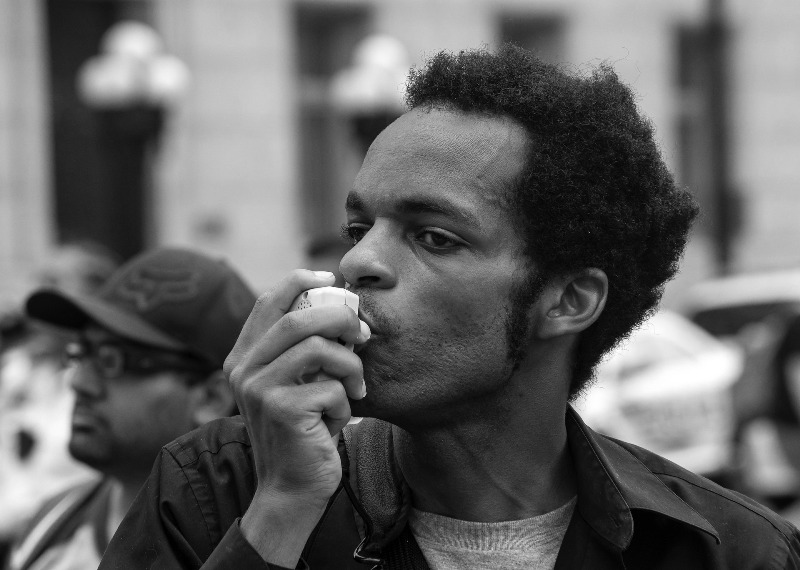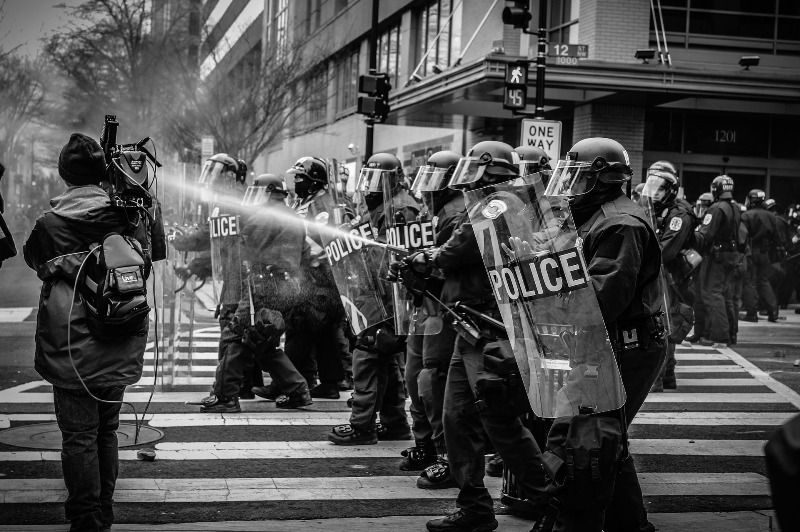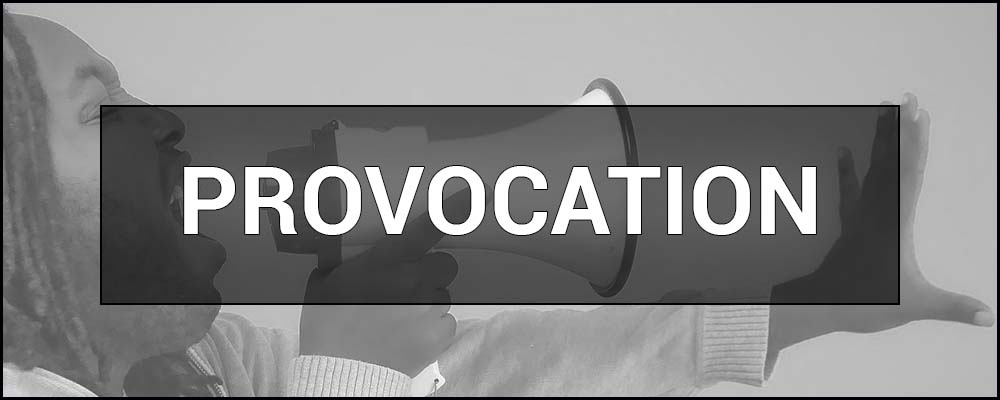A provocation is a specially targeted action or word intended to provoke a reaction, emotion, or conflict in others.
What is PROVOCATION – definition and meaning in simple words.
In simple terms, Provocation is essentially an attempt to induce another person to a certain reaction, emotion, or conflict through their actions or words.
It can be an intentional or unintentional act that causes someone to respond or react to certain stimuli. In other words, provocation is when someone tries to make you feel negative or force you into an argument or conflict. Provocations can have different purposes, including manipulating people, changing their opinions or beliefs, or even provoking aggression and conflict.

Who is a Provocateur – in simple words.
In simple terms, a provocateur is a person who intentionally causes a reaction, emotion, or conflict in other people through their actions or words.
In the context of political science, sociology and psychology, provocateurs can have different motives, such as achieving personal gain, manipulating groups or influencing social processes. There are different types of provocateurs who may act consciously or unconsciously, as well as those who take advantage of opportunities arising from social or political circumstances. Understanding the role of provocateurs in the interaction of individuals and groups helps to develop effective strategies to counter provocations and maintain harmonious relations.

Origin/etymology of the term and concept of provocation.
To understand the roots of the term “provocation,” we should look at its historical sources. The word “provocation” comes from the Latin “provocatio”, which means “challenge”. In turn, the Latin word “provocare” means “to cause” or “to induce”.
The concept of provocation has undergone significant changes over time. In the old days, provocation was mainly associated with challenges in the legal and political context, but later it spread to other areas of life. In particular, in interpersonal relations, psychology and sociology, provocation has come to mean attempts to influence the emotions and behavior of others.
Over time, the meaning, and use of the term “provocation” has also changed. They have become more universal, encompassing both conscious and unconscious attempts to manipulate, provoke aggression or conflict.

Main types or kinds of provocations.
Provocations can be divided into several types or categories, depending on their characteristics and scope. The main types of provocations include verbal, non-verbal, situational, psychological and emotional.
- Verbal provocations are actions or statements that use words and language to influence the emotions or behavior of others. These can include insults, bullying, disparaging comments, or ironic remarks.
- Non-verbal provocations are actions or gestures that do not use words, but can still cause an emotional reaction or conflict. For example, these can be provocative gestures, dismissive facial expressions, or ignoring.
- Situational provocations are cases where the circumstances or context of the situation become a provocative factor. Such provocations can arise from stressful situations, competition, or disagreements.
- Psychological provocations are attempts to influence a person’s psyche, beliefs, fears, or insecurities. These can include manipulative strategies, attempts to destabilize self-esteem, or cause aggression.
- Emotional provocations are attempts to influence a person’s emotional state, provoke strong emotional reactions or even loss of self-control. Emotional provocations can be carried out through emotionally charged events, dramatic situations, or cruel acts.
There are well-known examples of provocations in history.
Provocations have often been used in political and social history as a means of achieving certain goals or provoking reactions. Here are some of the most famous provocations in world history:
- Sinking of the Lusitania (1915): The sinking of a British passenger ship by a German submarine caused the deaths of more than 1,000 people, including American citizens, and became the basis for the US entry into World War I.
- Fire in the Reichstag (1933): The arson attack on the German parliament building, which was later blamed on communists, served as a provocation for Adolf Hitler to declare a state of emergency and establish the Nazi dictatorship.
- Provocation in the Gulf of Tonkin (1964): The incidents between American and North Vietnamese ships in the Gulf of Tonkin became the trigger for the beginning of full-scale US intervention in the hostilities in Southeast Asia
- The assassination of Archduke Franz Ferdinand (1914): The assassination of the heir to the Austrian throne by a Serbian nationalist was a provocation for the outbreak of World War I.
- The Cathedral and the Bazaar (1997): Eric Raymond’s essay on open source software sparked debate and drew attention to the open source philosophy.
- Attack on Fort Sumter (1861): The Confederate attack on Fort Sumter off the southern coast of the United States was a provocation for the outbreak of the American Civil War.
- Cuban Missile Crisis (1962): The deployment of Soviet missiles in Cuba, close to the US border, caused the most acute crisis of the Cold War and could have led to a nuclear war between the two world powers.
- The Boston Tea Party (1773): A protest against British tax laws, which resulted in a large amount of tea being thrown into the sea, became a provocation for the American Revolution.
- Gleiwitz incident (1939): A staged attack by Poles on a German radio station, staged by the Nazis, served as a provocation and “Casus Belli” for the German invasion of Poland and the beginning of World War II.
- The Marco Polo Provocation (1937): The Marco Polo incident on the bridge between China and Japan, when there was a clash between Chinese and Japanese troops, was the pretext for the outbreak of the Second Sino-Japanese War.
- The Fashoda Provocation (1898): This event was a dispute between Britain and France over control of the Fashoda territory in the Sudan. Although the conflict was eventually resolved diplomatically, it brought Britain and France closer to a near military conflict.

Meet the provocateurs – who are they?
-
Characteristics of provocateurs.
Provocateurs usually share some common traits, such as charisma, courage, agility, and the ability to manipulate people. They can also show the ability to adapt to different situations and quickly change their tactics.
-
Motivation of provocateurs.
Provocateurs may have different motivations for their actions, such as a desire to gain power, control, attention, or to achieve political or social change. In some cases, provocateurs may act in self-defense or in support of their group or community.
-
Types of provocateurs:
- Intentional provocateurs: These individuals deliberately use provocation to achieve their goals. They may have political, economic or personal motives for creating conflict or disagreement.
- Unintentional provocateurs: These provocateurs may not realize that their actions or words are causing provocation. They may be inexperienced, reckless, or simply inattentive.
- Opportunistic provocateurs: These provocateurs use provocations when they happen to arise. They can observe a situation and immediately use it to their advantage.
With this information, we can better understand who the provocateurs are, what their motives are, and how they interact with others.

Recognizing the main signs – how to spot a provocation?
Having the following skills and knowledge will help you better recognize provocation and avoid unnecessary conflicts.
- Key indicators of provocation: Some key signs of provocation may include aggressive language, intentional insults, dismissive attitudes, or attempts to elicit an emotional response. There may also be manipulative actions aimed at changing the behavior or opinions of others.
- The role of context in determining provocation: It is important to understand the context of the situation when observing a possible provocation. Evaluating the history of the interaction, personal relationships, and the general environment can help you determine whether a situation is provocative.
- The importance of emotional intelligence in identifying provocations: Emotional intelligence plays an important role in recognizing provocation. The ability to control one’s emotions, understand the emotions of others, and the ability to respond appropriately to emotionally charged situations allows a person to distinguish a provocation from other types of interaction.
How to respond to and resist provocations?
Responding appropriately and not succumbing to provocations is not an easy task. However, mastering the following strategies will help you respond effectively and remain calm in difficult situations.
- Strategies for maintaining self-control and avoiding escalation: To prevent the situation from escalating, take deep breaths, rationally assess the circumstances, and focus on your goals. Try not to react to provocations emotionally, as this can only escalate the conflict.
- Affirmative communication and setting boundaries: It is important to be able to clearly express your thoughts, feelings, and needs without allowing provocateurs to violate your personal boundaries. Set boundaries and stick to them, demonstrating your confidence.
- The value of empathy and understanding when dealing with provocateurs: Empathy and understanding the motivations of the provocateur can help you find an effective approach to communicating with them. Identify why the person may be behaving provocatively and try to show them that you understand their position. Respond to provocations in a calm but clear manner, emphasizing the importance of respect and constructive communication.
An in-depth look at provocation as a psychological phenomenon.
Studying the psychological aspects of provocation, its connection to emotional manipulation, group dynamics and social conflicts, allows us to better understand this phenomenon and develop strategies to counter it.
-
Psychological aspects of provocation.
Provocation is the manipulation of the feelings and emotions of others in order to elicit a reaction or change behavior. Provocation can have different reasons, including controlling a situation, strengthening one’s own position, or even just for fun.
-
The connection between provocation and emotional manipulation.
Provocateurs often use emotional manipulation, such as reinforcement, indirect cues, overt expression of dissatisfaction or bullying, to elicit the desired reaction. Accordingly, those who face provocation should learn to recognize and counteract such manipulations.
-
Provocation can play an important role in group relations and social conflicts. They can influence the formation of stereotypes, reinforce or change power relations, and force people to choose sides. Understanding the mechanisms of provocation can help to better manage group relations and social conflicts.
-
Provocation and personality traits.
Certain personality traits, such as high levels of neuroticism, a tendency toward aggression, and a need for control, can predispose a person to become a provocateur. On the other hand, people with a high level of emotional intelligence and empathy may be less prone to provocative actions.
-
Cognitive aspects of provocation.
Understanding how people perceive provocation and its consequences can help reveal the cognitive aspects of provocative situations. Of particular interest is the study of cognitive components such as attention, memory, perception, and decision-making in the context of provocation.
-
Provocation in a cultural context.
Culture influences the way people understand and respond to provocation. In some cultures, provocation can be an acceptable form of interaction, while in others it can be unacceptable and harmful. Learning about cultural differences can help people better understand and adapt to different forms of provocation.

Conclusion.
In this article, we have examined various aspects of provocations, including their historical context, psychological mechanisms, role in group relations and social conflicts, and characteristics of different types of provocateurs. The main conclusions are that in order to respond effectively to provocations, it is necessary to develop emotional intelligence, assertiveness, compassion, and the ability to understand the motivation of provocateurs. Applying the knowledge and skills gained will help you to improve your interaction with others and manage provocative situations more effectively.
FAQ (Frequently Asked Questions):
Provoking is an act intended to elicit a reaction or emotional response from another person, often with negative consequences.
Provocateurs are people who intentionally provoke or elicit a reaction from other people, often for their own gain or manipulation.
You can recognize a provocation by the context, the nature of the actions or words, and the emotional response they evoke.
You can respond to provocation by staying calm, setting boundaries, and using assertive communication to resolve the conflict.
People may provoke others for a variety of reasons, including a desire to draw attention to themselves, show dominance, or manipulate the emotions of others.
There are verbal, non-verbal, situational, psychological and emotional provocations.
Provocation is not always negative. Although it is often associated with manipulation and conflict, provocation can also promote development, stimulate creativity, or help people get out of their comfort zone.
The psychological mechanisms underlying provocation include emotional manipulation, reactivity, activation of defense mechanisms, and manipulation of social norms.




